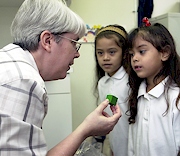April 17, 2007
Houston's Best Kept Secret St. Luke's Episcopal Health Charities
Celebrates 10th Anniversary
April 17, 2007 (Houston) - On April 17, St. Luke’s Episcopal Health Charities, a component of St. Luke’s Episcopal Health System, celebrated 10 years of community service. During the past decade, the organization, the largest public charity in Houston devoted solely to health, and perhaps Houston’s best-kept secret, has provided more than $66 million in funding support to programs for the medically underserved in 30 counties of South Texas while touching an estimated 10 million lives. The Charities was founded in 1997 under the leadership of the Rt. Rev. Claude E. Payne, now retired Bishop of the Episcopal Diocese of Texas, and Michael K. Jhin, CEO Emeritus of St. Luke’s Episcopal Health System. Its mission, as described by the Rt. Rev. Don A. Wimberly, DD, Bishop of the Episcopal Diocese of Texas, and chairman, Board of Directors, St. Luke’s Episcopal Health System, is “to extend the healing ministry of Christ to all God’s children.”
“Ten years ago, The Episcopal Diocese of Texas took an unprecedented step, dedicating $150 million to establish St. Luke’s Episcopal Health Charities with the purpose of improving the health of the underserved in The Episcopal Diocese of Texas,” said David J. Fine, president and CEO, St. Luke’s Episcopal Health System. “St. Luke’s Episcopal Health Charities effectively positions itself upstream from St. Luke’s role as an acute care center while embracing the original ecumenical intent of the hospital, and we are extremely proud of what it has accomplished.”
Nearly 25 percent of Texans and 32 percent of Houstonians do not have health insurance. Houston has the highest rate of uninsured of all major metropolitan areas in the nation. The Charities has made more than 1,100 community-based grants, some of which are ministries associated with the Diocese and others of which go to non-affiliated agencies. In addition to providing such support, St. Luke's Episcopal Health Charities has conducted research that has resulted in providing important health information to our community.
One form that information takes is the Community Health Information System, an online interactive website that contains demographic, health and social data on the 57-county Diocese, as well as data on more than 12,000 health and human service programs in the 13-county area of the Texas Gulf Coast. The newest feature on the site is Project Safety Net. Located at www.slehc.org, this bilingual website lists more than 70 safety-net clinics and associated services in Harris County.
Another research-based outcome is the Healthy Neighborhood Initiatives, a neighborhood-specific and participatory model that gathers in-depth community health information, permitting wise assessment and the development of prioritized programs. Now active in 10 Houston-area neighborhoods, the model serves also in the development of Federally Qualified Health Centers.
“By identifying community priorities with communities, St. Luke’s Episcopal Health Charities and its partners work together to meet these priorities and multiply the impact of resources in the neighborhoods served,” said Florence Wells McGee, chair, St. Luke’s Episcopal Health Charities.
St. Luke’s Episcopal Health Charities supports organizations, collaborations and initiatives that focus on the underserved in communities and neighborhoods. Some of the organizations receiving grants are small, volunteer-driven community organizations meeting the needs of specific communities. Others are sophisticated, larger non-profits that are models in their field. Programs supported by The Charities’ work focuses on the underserved, or address the health needs of specific populations, such as children, teens, and older adults. From mobile health services, youth nutrition and fitness initiatives to larger community collaboratives, such as the Prevention and Advocacy for Teen Health, these programs work effectively and in partnership with The Charities to advance community health: body, mind and spirit.
As we reflect back on our first decade of service, the results clearly demonstrate that collaborations are truly greater and more effective than the sum of their individual parts,” said Patricia Gail Bray, PhD, executive director, St. Luke’s Episcopal Health Charities. “We are thankful for our extraordinary partners who are making our community a healthier place for the individuals that we serve.”
During the 10 years that St. Luke's Episcopal Health Charities has been in existence, individuals and families of many faiths and ethnicities have been reached through these programs. This is in harmony with the Diocese's mission to serve all God's children wherever they may be and in whatever circumstances they may find themselves.
To learn more about St. Luke’s Episcopal Health Charities, visit www.slehc.org.


